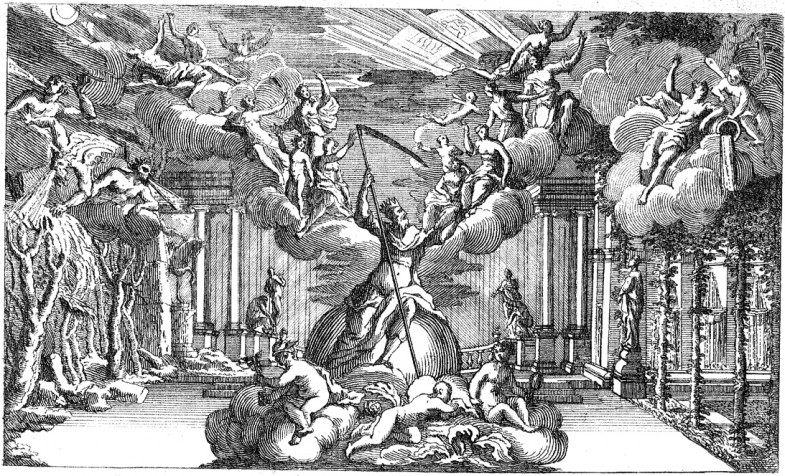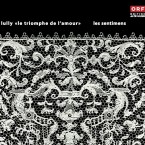
The Italian inventor of French opera
There was nothing apparent about giovanni Battista Lulli, born in Florence on 29th november 1632, which could have predestined him for a glorious musical career. Born into very modest surroundings, the boy was first introduced to music on the violin and guitar by the Franciscan monks of a nearby monastery. This was only the beginning of an unbelievable social ascent. The young Lulli was taken to France at the age of 13 by Roger de Lorraine, Chevalier de guise, who had been charged by his niece, la grande Demoiselle Anne-Marie-Louise d’Orléans, to bring her a sweet little italian boy if he should find one. He was first employed as a simple garçon de chambre by Mademoiselle at the Palais des Tuileries. He seems to have been much appreciated there and was able to continue his musical education, revealing at the same time such a marked talent for dancing that he was appointed maître à danser du roi at the age of 19. This was the start of a special relationship of complicity between Lully and the young king which was to last until the musician’s premature death. it became apparent in their common conception of absolutism; Louis XIV’s on the political scene and Lully’s in his career at court in the absolute service of his sovereign. in 1661 the king appointed Lully to the highest possible position to which he could aspire, Surintendant de la musique de la chambre du roi, and in the same year he was naturalised, officially becoming Jean-Baptiste Lully. In the wake of his great success in the genre of ballets and comédies-ballets, he turned to opera for the first time in 1673. The enthusiasm that greeted the first performance of Cadmus et Hermione, with a libretto by Philippe Quinault, was only the beginning of an exceptional collaboration between librettist and composer which was to result in an emblematic opus, truly establishing the canon of French opera. For opera was then in its infancy in France, seeking to gain a foothold in the face of italian, particularly Venetian, opera flourishing throughout Europe. Lully and Quinault revolutionised the genre. They simplified the drama, making it more compact and avoiding the numerous intrigues so beloved in Venice at the time. They practically reinvented French recitative, which became even more clear and concise than before. Their new style continued to triumph during the years of their collaboration, interrupted only by the accidental death of the composer in 1687. Throughout his career as Surintendant Lully enjoyed an absolute monopoly on opera in France, only granting the occasional licence to provincial theatres, which goes a long way to explain how his style became the absolute symbol of French music. His operas were continually being presented at court and knowledge of their many characters, airs, melodies or scenes became an indispensable cultural reference for any courtier.
Chamber Opera …
Thanks to his favoured position at court, Lully saw many of his operas published during his own lifetime. This was unique for the period in Europe, since high printing costs made editing such large-scale works difficult. in italy the ephemeral nature of productions, continually subject to changing fashions and an unbridled competition between impresarios, made publication unattractive and only the libretti enjoyed this privilege. In France however, the editions of these operas by Ballard, «seul éditeur du Roy pour la musique», contributed actively to their fame. Later, well after the composer’s death when the privilege of editing the music had finally expired, the publisher Baussen re-edited the operas, not however in full score like his predecessor but in reduction. Only the outer orchestral parts were notated, with the exception of the trios which were written out completely. These editions were more practical, more economical, and the technique of copper engraving made them more pleasant to read. The success of Lully’s operas, with permanent references to them being made in romantic literature, only served to increase distribution of the musical material. These re-editions are also evidence of a certain popularisation and a growing domestic use of the works. The most famous airs and scenes took their place in salons and in the musical life of numerous amateurs.
In the golden age of the harpsichord it was only natural to employ this instrument in such a repertoire. It was also an age in which François Couperin, known as Le grand, enjoyed great fame and who, in his preface to his Apothéose de Lully, evoked the possibility of playing the trios on two harpsichords rather than in their usual instrumentation. The development of harpsichord teaching and the publication of a high-quality repertoire led more and more people to appreciate the instrument and to play it themselves. As Couperin said, «The harpsichord is perfect in its range and brilliant in its nature», and the combination of two of these instruments extends their polyphonic capabilities still further, thus creating a body of sound particularly well-adapted to the realisation of orchestral scores.
In imaging a Parisian musical salon at the beginning of the 18th century, we may find two singers and two harpsichordists who have put together their favourite airs and scenes by Lully, performing them before a select audience …
Scenes and Airs from Lully’s Operas
«Tranquilles coeurs» aus «Le Triomphe de l’Amour» (1681)
Ouverture aus «Phaéton» (1683)
«Heureux qui peut voir du rivage» aus «Phaéton»
«Heureuse une âme indifférente» aus «Phaéton»
«Arrestons-nous icy» aus «Armide» (1686)
Air pour les démons et les monstres aus «Amadis» (1684)
«Je vais partir belle Hermione» aus «Cadmus et Hermione» (1673)
«Amour, voy quels maux tu nous fais» aus «Cadmus et Hermione»
«Toy qui dans ce tombeau» aus «Amadis»
«Ah! tu me trahis» aus «Amadis»
Chaconne aus «Amadis»
PAUSE
Ouverture aus «Bellérophon» (1679)
«Que ce jardin se change en un désert affreux» aus «Bellérophon»
Premier air aus «Bellérophon»
«Quel spectacle charmant» aus «Bellérophon»
«Ah! Si la liberté me doit être ravie» aus «Armide»
Passacaille aus «Armide»
«Le perfide Renaud me fuit» aus «Armide»
«Florestan! Corisande!» aus «Amadis»
Chaconne in C aus «Amadis»
«Amour, que veux-tu de moy?» aus «Amadis»
Jean-Baptiste Lully (1632-1687): Tranquilles Coeurs (from le Triomphe de l’Amour 1681)
 ORF CD available on www.amazon.fr
ORF CD available on www.amazon.fr